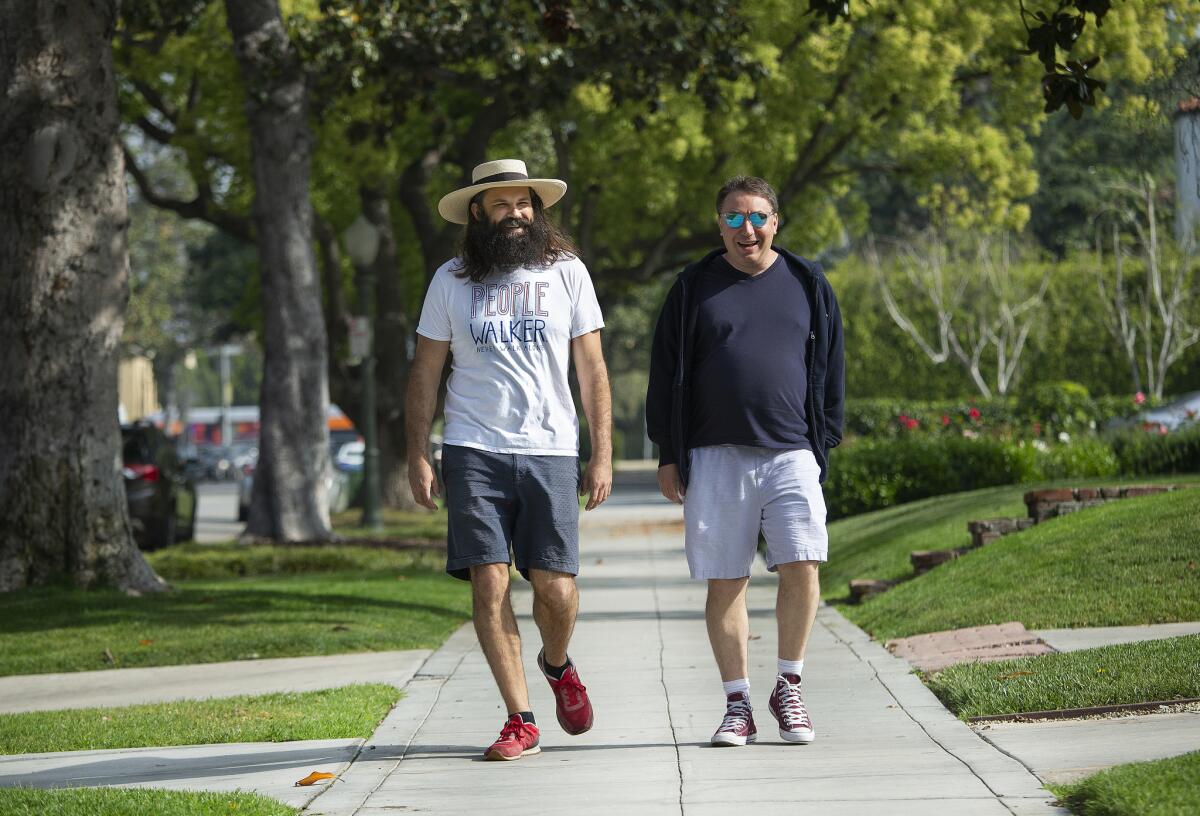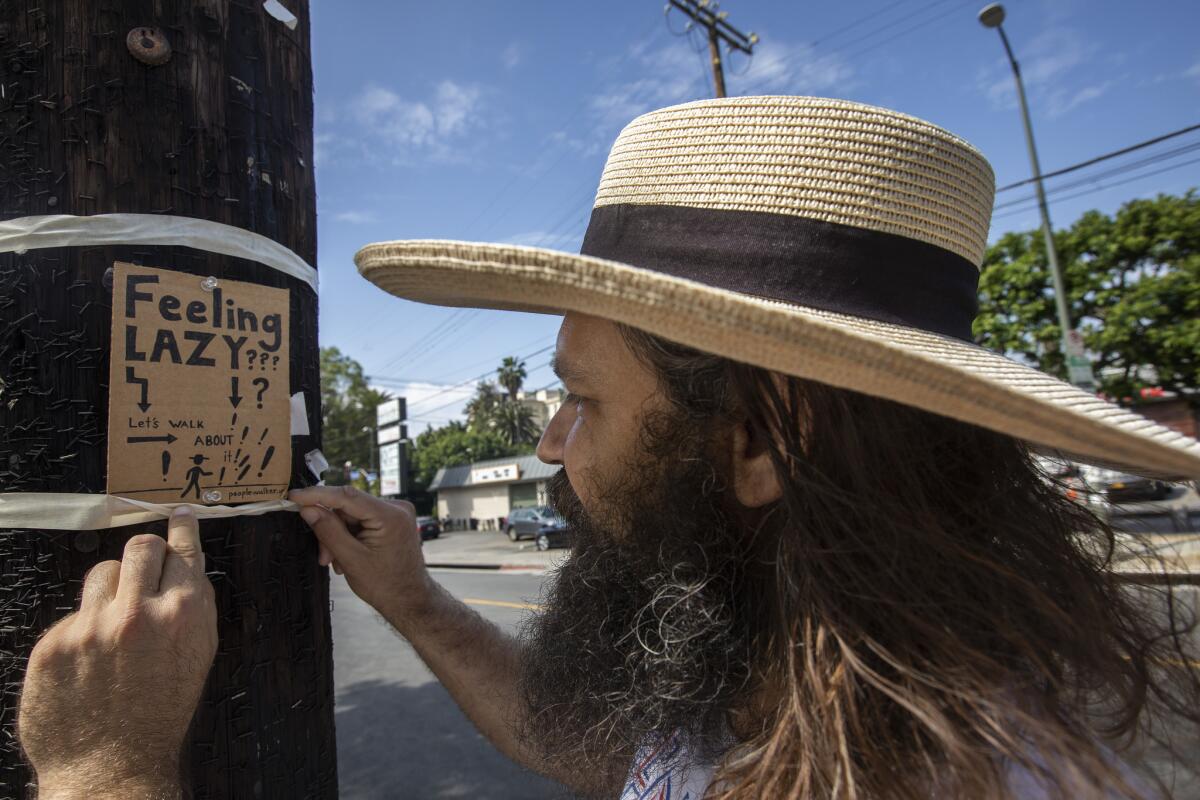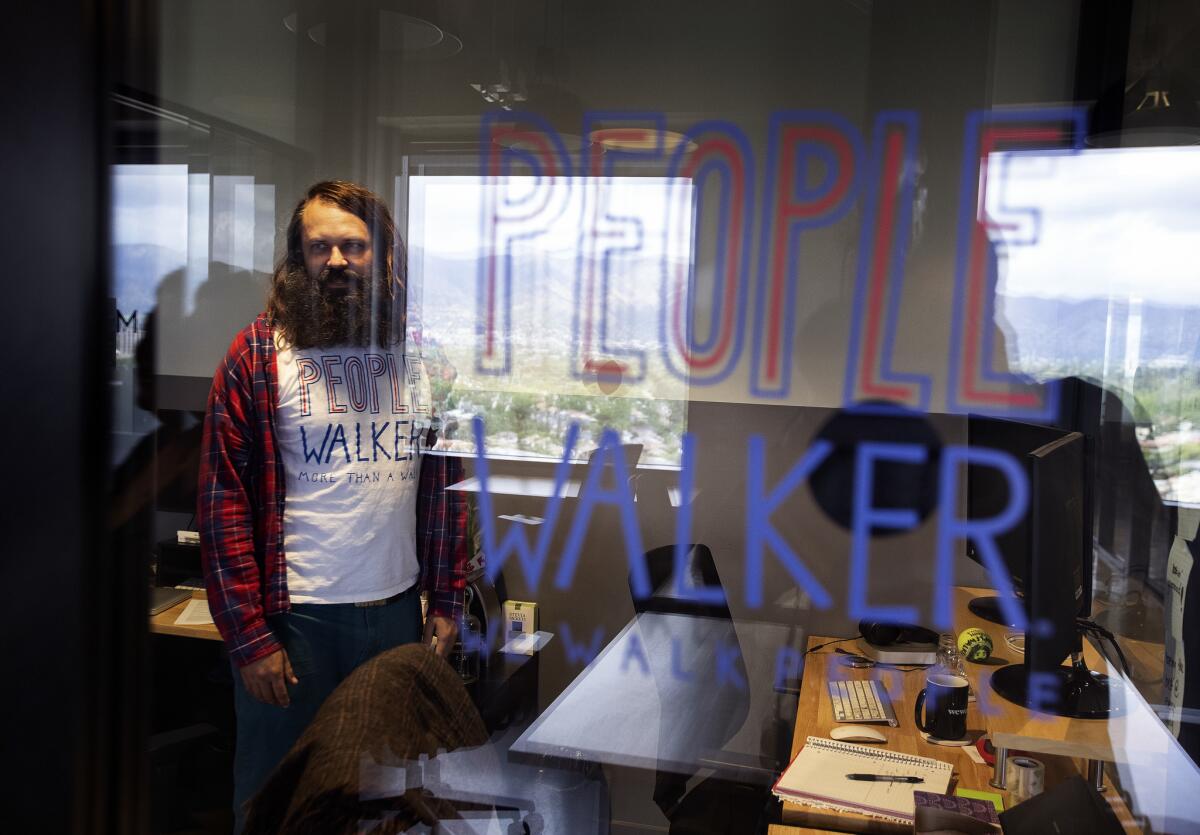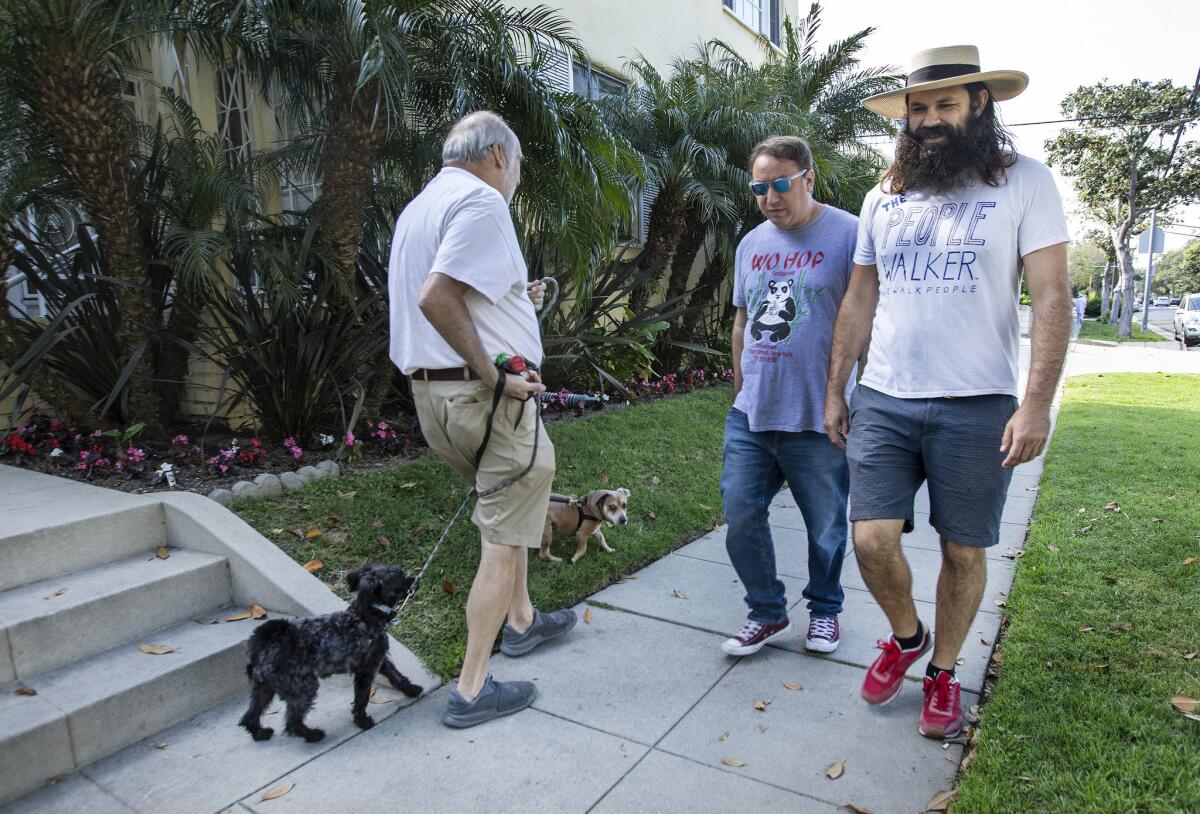City Beat: The loneliness problem in L.A. starts with traffic. Could it end with a walk?

When he put up signs in Los Angeles advertising himself as the People Walker, it wasn’t clear if Chuck McCarthy was serious. Three years in, he’s got an app, a business staff and a stable of fellow people-walkers.
It’s hard to imagine how some people stave off loneliness in Los Angeles.
Nearly a third of the city’s households consist of one person, according to the latest census numbers. They include young and old, rich and poor, and some particularly isolated modern city dwellers:
Those who work from home. Those who came here alone and now dart around L.A. in the gig economy, TaskRabbiting and delivering food for GrubHub.
RELATED: Introducing Nita Lelyveld, a new Times columnist writing about the way L.A. lives »
If you earn a living in a place with a regular staff and schedules, it’s tempting to envy more free-form existences. But don’t underestimate the value of spending time daily in the company of others who know your name, and speak to you, and would worry if you suddenly disappeared.
Research has shown that social isolation and its frequent companion, loneliness, can have health consequences so profound they can shorten our lives.
In L.A., people silently imploding from loneliness live among us — but we don’t talk much about it. When it comes to connecting, this city of 4 million can be especially challenging given how spread out it is, and how bad traffic is, and how many people move around solo in cars, and how relatively little rubbing shoulders takes place.

A few years ago, Chuck McCarthy started a business partly fueled by the human need to connect. But he didn’t see that right away, just as he didn’t realize the extent of his own isolation.
The affable art school graduate with a bushy beard and merry eyes mostly used to work on a laptop in a Hollywood coffee shop, trying to make ends meet by creating web GIFs and landing the occasional acting job.
At nearby tables, other people also stared at screens. Many wore noise-canceling headphones.
He talked so rarely in the course of a day that when he did, it often felt strange, as if he had a mouthful of marbles.
McCarthy and his girlfriend lived in a lower-rent part of Los Feliz he liked to call Less Feliz. They had each other, so they weren’t exactly lonely. But she worked at home, and the two didn’t spend much time out and about.
Then they made a rule that if they wanted restaurant food, they had to walk to get it.
En route to chicken tikka masala on Vermont or pad see ew in Thai Town, McCarthy kept seeing signs for personal training and dog walking.
As a joke at first, he mashed them together: Why just dogs? Most humans could use a good walk too.
The more he thought about it, the more launching a business to walk people began to make a certain oddball sense.
Some surely might worry about safety while walking alone. Others might need motivation. There might be those who would rather walk with their friends but simply live too far away from them.
All this was true — but perhaps not the central truth.

The standard measure of human loneliness was developed here about 40 years ago. It scores people based on how they answer a series of questions that get at the extent to which they feel connected to, and disconnected from, others. The health insurer Cigna used a version of the UCLA Loneliness Scale last year when it surveyed more than 20,000 American adults. Nearly half said they sometimes or always felt alone or left out. The youngest — Generation Z — were the loneliest, followed closely by millennials. And only 53% of all those questioned said they had meaningful, in-person social interactions daily.
“Scared to walk alone at night? Don’t like walking alone at all? Don’t want people to see you walking alone and assume you have no friends? Don’t like listening to music or podcasts but can’t walk alone in silence forced to face thoughts of the unknown future or your own insignificance in the ever expanding universe?” So went McCarthy’s first tongue-in-cheek sales pitch as the People Walker.
He started walking around in a hand-drawn T-shirt that declared his new profession, peppering neighborhood utility poles with funny promos — some cut out of cardboard or old jeans.
What could be more L.A. than a People Walker?
The media began calling almost before the first walk was booked. Then a steady stream of college students, retirees, waitresses and actors asked if they could earn a little cash on the side by becoming people walkers too.
Now McCarthy has a business, which gets a cut of walkers’ fees. He has investors. He even has a tiny glass office to go to in a co-working space high above Burbank.

On the People Walker app, you indicate where you want to walk and when — and if walkers are nearby, you have the chance to pick and choose.
Perhaps you want Taj, who graduated from UCLA, where he majored in music and minored in LGBT studies. His parents are East Indian and Filipino. His other passion besides music is mindfulness.
Or maybe you’d rather set out with Renata, an actress who would be happy to teach you Spanish. She loves “improv, movies, food, hikes, coffee, desserts.”
Endri, who says walks can be “as therapeutic as a vacation at the beach,” speaks Italian and Albanian and has a business degree. Esther is a Korean-speaking mental health therapist who loves cooking and cats.
McCarthy has learned that such descriptions are key, because the talk often is as important as the walk.
“We’ve gone into this era where people don’t even like to call the people they know. Everybody wants to text,” he said. “Technology isn’t just taking jobs. I think a lot of times what people are really paying for is to have someone listen and to feel heard and feel important.
“You might have 5,000 friends on Facebook and then you go on and say, ‘I had a terrible day,’ and no one responds. That 5,000 friends is your giant blanket but it’s not keeping you warm.”
But can paying for conversation really do the trick? That may be hard for some people to stomach — or afford.
Ideally, you might seek social sustenance from a community or religious group or from people who share one of your hobbies. But if you know no one, finding someone to talk to one-on-one may seem daunting. And paying for the company of a person who has been vetted and background-checked may seem, if not ideal, at least worth the expense.
Sam Pocker, a darkly funny artist, works by himself at home. He writes songs and performs them on YouTube.
“They won’t make eye contact / For you can see their fear / Or even worse the dead look / That makes me wonder why I’m here,” go the lyrics of “Los Angeles Sucks and I Want to Die.”
When he spotted one of McCarthy’s fliers about a year ago, daily in-person moments were rare for him. He had just moved to L.A. from New York. His friends were back East. They still are.

“I moved here knowing a couple of rock stars and somebody from high school — but they don’t live close,” he said recently. “I have one friend who’s married and has kids, and they invite me over when it’s a holiday, you know, and that’s good.”
What has changed is that every day now Pocker leaves his apartment and goes out into the fresh air and walks while he talks with another human being.
He first hired McCarthy, he said, out of morbid curiosity. He thought the People Walker idea was so silly and so certain to fail. But then he had health problems and he was stir-crazy and he knew he had to move. So he booked every available walker in turn.
Now he has at least one half-hour People Walker appointment a day. On weekend days he often has two. The walkers, who are contractors, all set their own rates. McCarthy charges $7 a half-hour (which doesn’t, by the way, include the half-hour it takes him each way to walk from his place to Pocker’s).
“I’m sure it seems crazy, but it’s cheaper than a gym, it’s been quite beneficial and I get good stories out of it,” Pocker said.
On rainy days, he has hired walkers to join him at Costco and Ikea. Mostly they meet outside his Hollywood building and walk south down his street as it turns from apartments, studios and cityscape to big suburban-style homes with matching big front lawns.
It’s different from doing exercises with a trainer. It’s also different from pure friendship.
But every day Pocker is out there, being seen and being heard. And in a big city of strangers, maybe that helps.
CITY BEAT: Let’s share our stories about our lives in L.A. »

L.A. Times Today airs Monday through Friday at 7 p.m. and 10 p.m. on Spectrum News 1.
More to Read
Sign up for Essential California
The most important California stories and recommendations in your inbox every morning.
You may occasionally receive promotional content from the Los Angeles Times.











